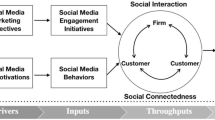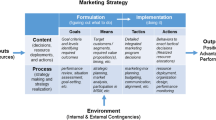Abstract
Purpose The purpose of this paper is to develop an ethical framework for the marketing of corporate social responsibility. Methods The approach is a conceptual one based on virtue ethics and on the corporate identity literature. Furthermore, empirical research results are used to describe the opportunities and pitfalls of using marketing communication tools in the strategy of building a virtuous corporate brand. Results/conclusions An ethical framework that addresses the paradoxical relation between the consequentialist perspective many proponents of the marketing of CSR adopt, and ethical perspectives which criticize an exclusive profit-oriented approach to CSR. Furthermore, three CSR strategies in relation to the marketing of CSR are discussed. For each CSR strategy it is explored how a corporation could avoid falling into the promise/performance gap.
Similar content being viewed by others
References
Aaker, J., S. Fournier and S.A. Brasel: 2004, ‹When Good Brands Do Bad’, Journal of Consumer Research, Vol. 31:1, 1–16
Aristotle: 1934, The Nicomachean Ethics (Harvard University Press, Cambridge, Massachusetts)
Balmer, J.: 2003, ‹The Three Virtues and Seven Deadly Sins of Corporate Brand Management’, in Balmer, J., and S. Greyser (eds.): 2003, Revealing the Corporation. Perspectives on Identity, Image, Reputation, Corporate Branding, and Corporate-Level Marketing (Routledge, London/ New York)
Balmer, J., and S. Greyser (eds.): 2003, Revealing the Corporation. Perspectives on Identity, Image, Reputation, Corporate Branding, and Corporate-Level Marketing (Routledge, London/ New York)
Bhattacharya, C.B, and S. Sen: 2004, ‹Doing Better at Doing Good: When, Why, and How Consumers Respond to Corporate Social Initiatives’, California Management Review, Vol. 47, 9–24
Becker-Olsen, K.L., B.A. Cudmore, and R.P. Hill: 2006, ‹The Impact of Perceived Corporate Social Responsibility on Consumer Behavior’, Journal of Business Research, Vol. 59, 46–53
Brown, T.J. and P.A. Dacin: 1997, ‹The Company and the Product: Corporate Associations and Consumer Product Responses’, Journal of Marketing, 61, 68–84
Collier, J.: 1995, ‹The Virtuous Organization’, Business Ethics: A European Review, Vol 4, 143–149
Collins, J.C. and J.I Porras: 1997, Built to Last, Successful Habits of Visionary Companies (Harper Business, New York)
Commission of the European Communities: 2002, Communication from the Commission Concerning Corporate Social Responsibility: A Business Contribution to Sustainable Development (Brussels)
Entine, J.: 1994, ‹Shattered Image’, Business Ethics, October, 1994, 23–28
Entine, J.: 2002, ‹Body Flop: Anita Roddick Proclaimed that Business Could be Caring as well as Capitalist. Today the Body Shop is Struggling on Both Counts’, Report on Business Magazine 31 May
Feldwick, P.: 2002, What is Brand Equity Anyway?, (World Advertising Research Center, Henley on Thames, UK)
Fombrun, C. J. and C. B. M. van Riel: 2003, ‹The Reputational Landscape’, in J. Balmer and S. Greyser (eds.), Revealing the Corporation. Perspectives on Identity, Image, Reputation, Corporate Branding, and Corporate-Level Marketing (Routledge, London/New York)
Gustafsson, C.: 2005, ‹Trust as an Instance of Asymmetrical reciprocity: an Ethics Perspective on Corporate Brand Management’, Business Ethics: A European Review, Vol. 14, 142–150
Hamel, G. and C, Prahalad: 1994, Competing for the Future (Harvard Business School Press, Boston)
Hartman, C.L., and C.L. Beck-Dudley: 1999, ‹A Case Analysis of The Body Shop, International, Journal of Business Ethics, 20, 249–263
Hill, C.W. L. and T.M. Jones: 1992, ‹Stakeholder-agency Theory’, Journal of Management Studies, Vol. 29, 131–154
Hume, D.: 2003, A Treatise of Human Nature (Oxford University Press, Oxford/New York), originally 1739/40
Kaaij, J. van der: 2006, Corporate Philanthropy at Work: U2 Can Move the World (B): Mailmen on a Mission, International Institute for Management Development, Lausanne
Kotler, P. and N. Lee, N.: 2005, Corporate Social Responsibility. Doing the Most Good for Your Company and Your Cause (John Wiley and Sons, Hoboken New Jersey)
Maignan, I.: 2001, ‹Consumers’ Perceptions of Corporate Social Responsibilities: A Cross-Cultural Comparison’, Journal of Business Ethics, Vol. 30, 57–72
Maignan, I. and D.A. Ralston: 2002, ‹Corporate Social Responsibility in Europe and the U.S.: Insights from Businesses’ Self-Presentations’, Journal of International Business Studies, Vol. 33, 497–514
Maio, E.: 2003, ‹Managing Brand in the New Stakeholder Environment’, Journal of Business Ethics, Vol. 44, 235–246
Middlemiss, N.: 2003, ‹Authentic Not Cosmetic: CSR as Brand Enhancement’, Journal of Brand Management, 10 (4/5), 353–361
Mitchell, R., B.Agle, and D. Wood: 1997, ‹Toward a Theory of Stakeholder Identification and Salience: Defining the Principle of Who and What Really Counts’, Academy of Management Review, Vol. 22, 853–886
Murphy, P.E.: 1999, ‹Character and Virtue Ethics in International Marketing: An Agenda for Managers, Researchers and Educators’, Journal of Business Ethics, Vol. 18, 107–124
Phillips, R., R.E. Freeman and A.C. Wicks: 2003, ‹What Stakeholder Theory is not’, Business Ethics Quarterly, Vol. 13, Issue 4, 479–502
Pine, J., J. Gilmore: 1999, The Experience Economy: Work is Theatre & Every Business a Stage, (Harvard Business School Press, Boston)
Porter, M. and M. Kramer: 2002, ‹The Competitive Advantage of Corporate Philanthropy’, Harvard Business Review, December, 57–68
Porter, M. and M. Kramer: 2006, ‹Strategy and Society: The Link Between Competitive Advantage and Corporate Social Responsibility’, Harvard Business Review, 12, 78–93
Roddick, A.: 1991, Body and Soul (Vermilion, London)
Schlegelmilch, B.B. and I. Pollach: 2005, ‹The Perils and Opportunities of Communicating Corporate Ethics’, Journal of Marketing Management, Vol. 21, 267–290
Sen, S. and C.B. Bhattacharya: 2001, ‹Does Doing Good Always Lead to Doing Better? Consumer Reactions to Corporate Social Responsibility’, Journal of Marketing Research, 38 (2), 225–243
Solomon, R.: 1993, Ethics and Excellence. Cooperation and Integrity in Business (Oxford University Press, New York)
Stoll, M.L. 2002: ‹The Ethics of Marketing of Good Corporate Conduct’, Journal of Business Ethics, Vol. 41, 121–129
Webb, D.J. and L.A. Mohr: 1998, ‹A Typology of Consumer Responses to Cause- Related Marketing: From Skeptics to Socially Concerned, Journal of Public Policy & Marketing, Vol. 17, 226–238
Williams, B.: 2002, Truth and Truthfulness (Princeton University Press, Princeton/Oxford)
Acknowledgments
The author would like to thank Ronald Jeurissen, Patrick Murphy, Johan Graafland, Wim Dubbink, Mandy Bosma, Corrie Mazereeuw- van der Duijn Schouten, Jeffery Smith, and the special issue editors for their helpful comments on earlier versions of this paper.
Author information
Authors and Affiliations
Corresponding author
Rights and permissions
About this article
Cite this article
van de Ven, B. An Ethical Framework for the Marketing of Corporate Social Responsibility. J Bus Ethics 82, 339–352 (2008). https://doi.org/10.1007/s10551-008-9890-1
Received:
Revised:
Accepted:
Published:
Issue Date:
DOI: https://doi.org/10.1007/s10551-008-9890-1




